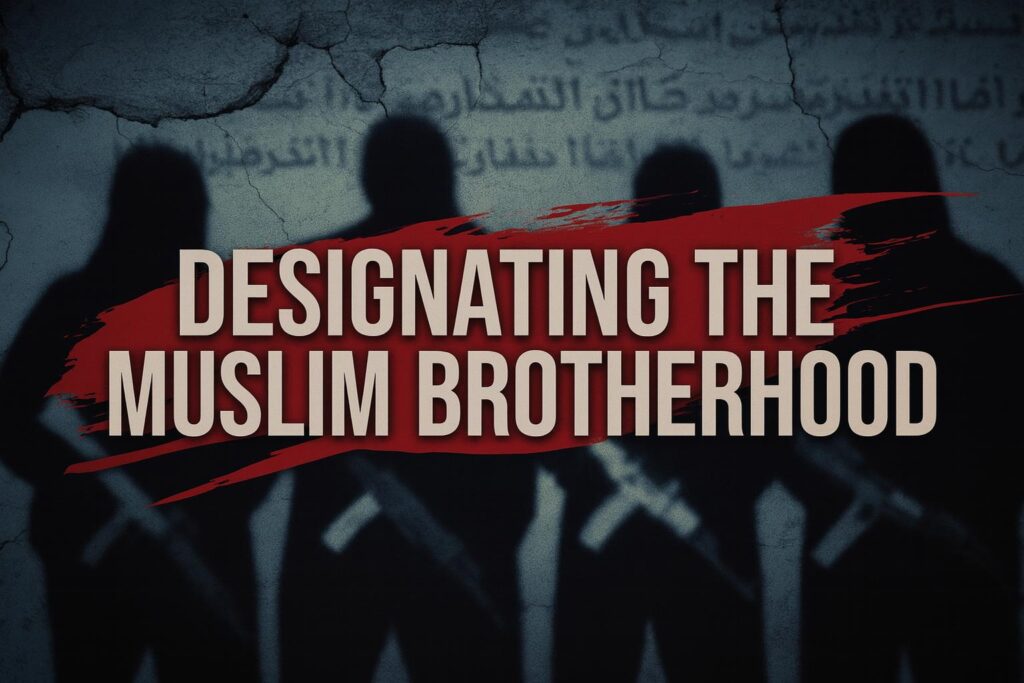Under President Trump’s second administration, lawmakers have reintroduced legislation to formally designate the Muslim Brotherhood as a terrorist organization. On July 16, 2025, Representatives Mario Díaz-Balart (R-FL) and Jared Moskowitz (D-FL), co-chairs of the Friends of Egypt Caucus, introduced the bipartisan Muslim Brotherhood Terrorist Designation Act of 2025.
The bill directs the President and Secretary of State to designate the global Brotherhood as a terrorist organization, prohibit financial transactions with it, block entry of its members into the United States, and require regular reports cataloging Brotherhood branches engaged in terrorism. Díaz-Balart emphasized that the Brotherhood’s vast network, including Hamas, spreads violence across the Middle East and poses a threat to U.S. national security.
The Muslim Brotherhood has a long history of violence, despite often presenting itself as a peaceful political and social movement. In mid-20th century Egypt, the Brotherhood’s “Secret Apparatus” (al-jihāz al-sirrī) carried out assassinations and bombings. In 1948, it killed Egyptian Prime Minister Mahmoud an-Nuqrashi, and in 1949 it attempted to assassinate Judge Ahmad El-Khazindar. Members were also implicated in attacks on British targets and Jewish businesses in Cairo. After the ouster of Brotherhood leader and Egyptian president Mohamed Morsi in 2013, authorities accused Brotherhood networks and sympathizers of organizing violent protests and attacks on police stations and churches. Although the leadership denied responsibility, accusations of violence persisted.
The most significant Brotherhood offshoot is Hamas, founded in 1987 as its Palestinian branch. Hamas has conducted suicide bombings, rocket attacks, and other operations against Israeli civilians and soldiers including the 2023, October 7th attack which killed 1,200 mostly civilians. Other Islamist factions, including elements of Palestinian Islamic Jihad, also trace their origins to Brotherhood networks in Gaza and Egypt.
Beyond direct branches, the Brotherhood’s ideological influence has been far-reaching. Sayyid Qutb, one of its most influential intellectuals, inspired figures such as Osama bin Laden and Ayman al-Zawahiri, shaping al-Qaeda’s global jihad strategy. ISIS leaders likewise cited Qutb’s writings as foundational, adapting his call for revolutionary change into an immediate demand for armed jihad and the creation of a caliphate. Brotherhood-linked networks elsewhere, such as Hassan al-Turabi’s Islamist movement in Sudan or the Syrian Muslim Brotherhood, have alternated between politics and militancy, with uprisings like the 1982 Hama revolt leaving thousands dead.
An internal 1991 strategy paper for the Muslim Brotherhood’s U.S. Shura Council — “An Explanatory Memorandum on the General Strategic Goal for the Group in North America” (Mohamed Akram/Mohamed Adlouni), outlines a long-term, incremental plan to embed and expand Islamic influence across American society. Seized by the FBI and entered into evidence at the Holy Land Foundation trial, the memo describes a “civilization-jihadist” process: patient settlement (tamkeen) by individuals, families, institutions, and organizations; coalition-building to unite Muslim groups under Brotherhood leadership; and the creation or co-optation of front organizations in education, relief, politics, and professional life.
The memorandum emphasizes stealth and persistence over open confrontation: build cultural authority, neutralize opposition, and use legal, political, and social levers to transform institutions. While it uses blunt language about “eliminating and destroying Western civilization from within,” its operational advice is practical and gradual, to found and coordinate organizations, influence mosques, charities, schools, media, law, and politics, and patiently shift institutions until Islamic values predominate. As such, the document is direct evidence that the Brotherhood pursued a covert, methodical program of institutional penetration in North America, tying ideological aims to concrete organizational and coalition strategies for long-range influence.
Several Arab governments have banned the Muslim Brotherhood, viewing it as both a political and religious threat to their stability. Egypt, Saudi Arabia, and the United Arab Emirates outlawed the group after decades of tension with its ideology and grassroots organizing. Jordan recently banned the Brotherhood and raided premises, citing security threats.
In Egypt, the Brotherhood rose to power after Hosni Mubarak’s fall in 2011, winning both presidential and parliamentary elections. President Mohammed Morsi’s increasingly authoritarian rule triggered mass protests, leading to a military coup, massacres of Brotherhood supporters, and the group’s designation as a terrorist organization. Saudi Arabia followed with its own ban in March 2014, and the UAE in November, with religious authorities denouncing the Brotherhood as a partisan movement that spread division and incited violence.
By contrast, Qatar has long been the Brotherhood’s chief patron, supporting branches across the region since the 1950s and sheltering exiled leaders such as Yusuf al-Qaradawi after Morsi’s ouster. Doha funneled billions into Morsi’s government, backed Brotherhood-linked movements during the Arab Spring in Tunisia and Libya, and has been Hamas’s largest state sponsor, providing over $1 billion in aid, hosting its political office, and amplifying its message through Al Jazeera.
Turkey, under President Recep Tayyip Erdogan, has likewise become a central champion. After 2013, Ankara hosted Brotherhood leaders fleeing Egypt, extended political and financial support to Hamas, and repeatedly defended the group, even after the October 7 massacre. Erdogan’s Justice and Development Party (AKP), rooted in Brotherhood ideology, has promoted Islamist movements abroad, protested Morsi’s ouster, and built Brotherhood-linked institutions inside Turkey. Alongside Qatar, Turkey remains the Brotherhood’s most important state sponsor.
The Obama and Biden administrations declined to designate the Brotherhood as a terrorist organization, a decision often attributed to liberal ideology focused on diversity, equity, and inclusion. Yet this stands in contrast to Muslim-majority states like Egypt, Saudi Arabia, and the UAE, which have already banned the group.
Critics argue the main obstacles to designation are legal durability and enforcement, given the Brotherhood’s decentralized structure. Trump, however, appears ready to move forward, judging the evidence sufficient and leaving enforcement issues to be addressed later. With many Arab states welcoming the move, the only significant objections would come from Turkey and Qatar, nations he has already criticized for supporting Hamas and undermining regional stability.
Read the full article here


